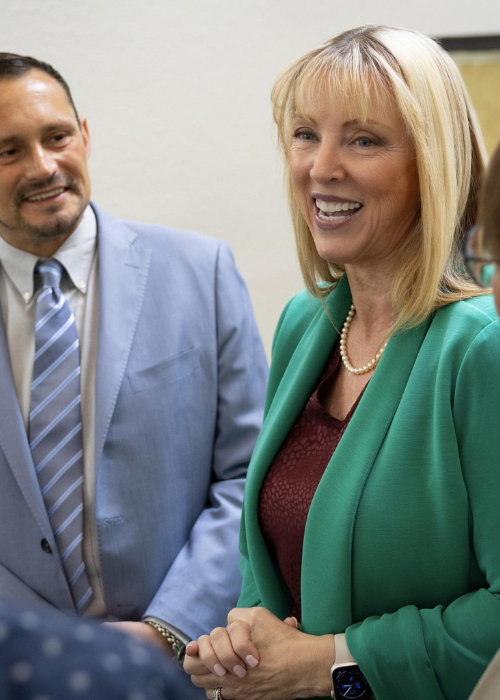When Rhonda Shader first joined the Placentia City Council in northern Orange County, California, her new job came with a rude awakening: the city only had $49 in its bank account.
“I remember thinking, ‘How are we even going to make payroll?’” she told IW Features. “We were literally on the verge of bankruptcy.
Yet, by the time Shader left office eight years later, the city of Placentia had more than $15 million in reserves. That transformation, she explained, wasn’t a miracle nor a federal bailout. It took fiscal responsibility and the prioritization of free market policies through “long hours, a lot of tough votes, and a total change in mindset”––thanks to Shader’s motivation and leadership.
Shader, a lifelong small-business owner and insurance agent, didn’t originally set out to be a public servant. But she “always respected people who step aside from their lives to serve,” she said, because for our government to work as initially intended, “people have to be willing to sacrifice.”
That sacrifice became personal when she stepped up and joined the city council. Shader recalled taking time away from her business, her husband, and her family in general, but to her, the trade-offs were worth it. And she didn’t want to simply go through the motions.
“If you agree to serve, you have to be faithful to it. You owe people your full effort,” she said. That effort paid off.
Shader and her colleagues inherited decades of financial decay and reversed it, largely by questioning every sacred cow of city spending. When she learned Placentia’s contract for county fire services was gobbling up the budget, for example, she led a charge to create a city-run fire department instead––the first of its kind for Placentia.
“It sounded crazy at first,” Shader admitted. “But starting our own department saved us about $30 million over 10 years. Our response times dropped, and our costs dropped. That’s not supposed to happen in government.”
She also became her city’s most persistent recruiter, personally taking time to travel to conventions and pitch businesses like Starbucks, Chick-fil-A, and more on opening locations in Placentia.
But if she brought them in, she pointed out, the development department had to make it easy for them to stay.
“You make it easy to do business, and suddenly, everyone wants to invest. The free market works––if you let it,” she said.

This pro-business instinct has guided Shader’s career and inspired her campaign for California state Senate. After watching Sacramento push policies that she says suffocate opportunity, Shader believes those same principles she implemented to rebuild Placentia could revive the rest of the state. But that’s only possible if bureaucrats would get out of the way.
“California has made it nearly impossible to grow,” she said. “It’s not one big tax––it’s death by a thousand cuts. Fees, regulations, mandates, reporting… it all adds up.”
Shader estimated that during her tenure, Placenta had to add at least five full-time employees just to handle the new reporting requirements from Sacramento, spanning paperwork on trash, water, and infrastructure that she said did very little to improve services.
“It’s 100% more cost for 0.1% benefit,” she explained. “No private company would operate like that. In California government, it’s normal.”
So, Shader eventually grew tired of playing defense.
“When you’re sitting in that council chair and Sacramento passes some new bill, suddenly your police department can’t do what it used to do. You’re constantly working around it,” she said.
That frustration inspired her to run for state Senate. “I met with 100 businesses in 100 days,” Shader said. “Insurance, manufacturing, service, you name it. Every single one of them is hurting, and most of it traces back to overregulation.”
In response, she came away with a list of ideas she calls “rollback bills.” In her eyes, Sacramento doesn’t need new rules, it needs to undo bad ones.
“Sacramento passes up to 2,500 bills every session and about 800 make it through,” Shader explained. “Half of them exist to fix the ones that didn’t work the first time.”
On a national level, Shader sees the Big Beautiful Bill––signed into law this past summer by President Donald Trump––as a powerful counterbalance to Sacramento’s tax-happy culture. The bill, which serves as the Trump administration and Congress’s effort to extend the middle-class and small-business tax relief from the 2017 Tax Cuts and Jobs act, offers what Shader called “real oxygen” for Californians who are suffocating under burdensome state policies.
“It gives us relief that our state government won’t,” she said. “Keeping those federal tax cuts means more spendable cash for people who are just trying to survive in one of the most expensive states in the country.”

Shader noted that she has been particularly enthusiastic about the Big Beautiful Bill’s provisions to eliminate taxes on tips, overtime pay, and Social Security income, stating that the breaks not only help workers, but employers, too.
“Your restaurant servers, your manufacturers with overtime shifts, your seniors on fixed income––those are the people this bill helps,” Shader said, “If my employee pays less in federal tax, that means my business pays less too. It’s simple, and it’s fair.”
She also praised the bill’s Child Tax Credit expansion. After all, California’s birth rates hit historic lows in 2023, with its total fertility rate well below the level needed for population replacement. This decrease of nearly 100,000 births is partially credited to the high cost of living for those remaining in the state and the departure of families with children.
“We need people making babies,” Shader said. “Not everyone can stay home, and childcare in California is insanely expensive. This [Child Tax Credit] helps families and keeps the economy moving.”
Most importantly, she said, recent tax cut efforts send a cultural message to legislators that cutting waste and respecting taxpayers matters once more.
“When people say, ‘Oh, it’s only $1.5 billion [cut] in a trillion-dollar budget,’ I say, ‘That’s where you start.’ It’s a mindset. If leaders care about how money is spent, that attitude filters down through every department, every city, every household,” she said.
Shader is under no illusion that the battle ahead is an uphill one. As of right now, conservative legislators in Sacramento are outnumbered, she explained. “But if we can just break the [Democrat] supermajority, the conversation changes. We get debate again. We get accountability again,” she said.
In the meantime, Shader believes there’s still hope, particularly if local and federal reforms work together.
“When Washington passes something like the Big Beautiful Bill, it trickles down,” she pointed out. “If I’m doing my part at the city level and my state and federal government are helping, now we’re really talking.”
Shader emphasized a simple philosophy: government should empower, not oppress. It’s the same mindset that turned her near-bankrupt city into a model for fiscal recovery, and one she admires from the current administration.
“People think these problems are too big to fix,” she said. “They’re not. They just take courage, common sense, and the humility to admit when government should step aside.”











